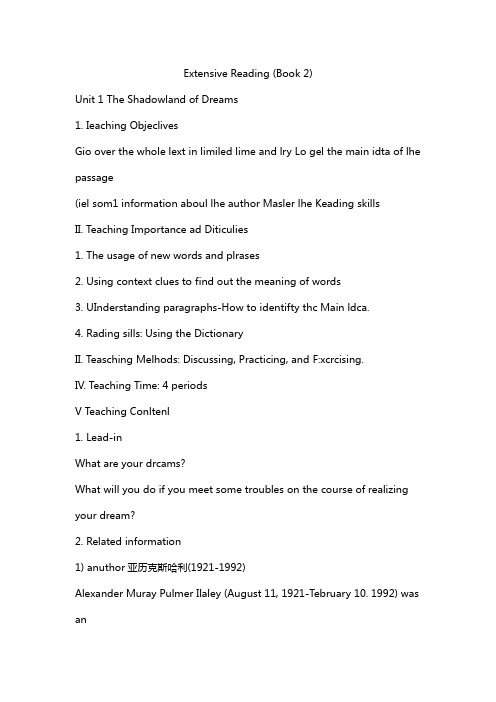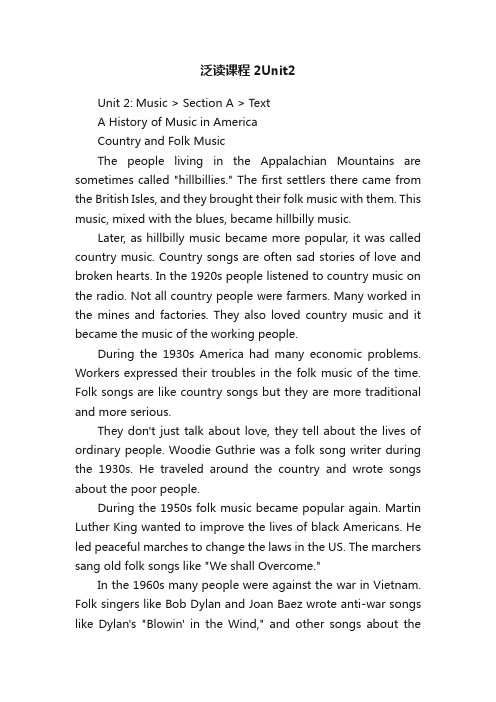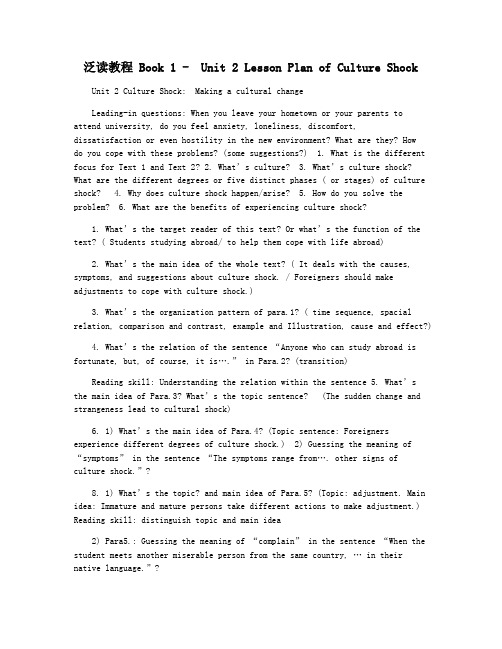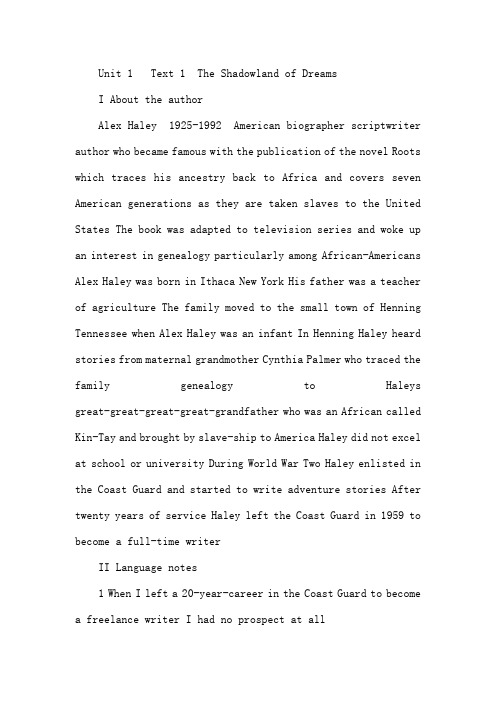英语泛读教程Unit Two
- 格式:doc
- 大小:41.50 KB
- 文档页数:4

Extensive Reading (Book 2)Unit 1 The Shadowland of Dreams1. Ieaching ObjeclivesGio over the whole lext in limiled lime and lry Lo gel the main idta of lhe passage(iel som1 information aboul lhe author Masler lhe Keading skillsII. Teaching Importance ad Diticulies1. The usage of new words and plrases2. Using context clues to find out the meaning of words3. UInderstanding paragraphs-How to identifty thc Main ldca.4. Rading sills: Using the DictionaryII. Teasching Melhods: Discussing, Practicing, and F:xcrcising.IV. Teaching Time: 4 periodsV Teaching Conltenl1. Lead-inWhat are your drcams?What will you do if you meet some troubles on the course of realizing your dream?2. Related information1) anuthor亚历克斯哈利(1921-1992)Alexander Muray Pulmer Ilaley (August 11, 1921-Tebruary 10. 1992) was anAmerican wriler. Ile is best known as the author of Rools.非洲商的美国作家。

泛读课程2Unit2Unit 2: Music > Section A > TextA History of Music in AmericaCountry and Folk MusicThe people living in the Appalachian Mountains are sometimes called "hillbillies." The first settlers there came from the British Isles, and they brought their folk music with them. This music, mixed with the blues, became hillbilly music.Later, as hillbilly music became more popular, it was called country music. Country songs are often sad stories of love and broken hearts. In the 1920s people listened to country music on the radio. Not all country people were farmers. Many worked in the mines and factories. They also loved country music and it became the music of the working people.During the 1930s America had many economic problems. Workers expressed their troubles in the folk music of the time. Folk songs are like country songs but they are more traditional and more serious.They don't just talk about love, they tell about the lives of ordinary people. Woodie Guthrie was a folk song writer during the 1930s. He traveled around the country and wrote songs about the poor people.During the 1950s folk music became popular again. Martin Luther King wanted to improve the lives of black Americans. He led peaceful marches to change the laws in the US. The marchers sang old folk songs like "We shall Overcome."In the 1960s many people were against the war in Vietnam. Folk singers like Bob Dylan and Joan Baez wrote anti-war songs like Dylan's "Blowin' in the Wind," and other songs about theproblems of American society. Folk music continued to be the most political of all music in America.Rock 'n' RollThe 1950s were an exciting time for music in America. The economic problems of the 30s and the war of the 40s were over. America was rich again. A new group of people became important—American teenagers. For the first time in history young people had money to spend. They had a new way of dressing, new hairstyles and new dances.In the early 50s slow romantic songs were still popular. But teenagers wanted dance music with a good beat, and so they began to listen to R & B (rhythm and blues) on the black radio stations. Rock and roll music had a strong dance beat. The musicians played electric guitars and the music was loud and fast. American teenagers loved it.About the same time, the owner of Sun Record Company, Sam Phillips said "If I could find a white man who had the Negro (black) sound and the Negro feel, I could make $1 billion." He found his wish in Elvis Presley, the king of rock and roll. Elvis became a new American hero and young people copied his hairstyle, his dress, and his music.Soul, Disco and RapAfter World War II a large number of black people moved from the South to the big industrial cities like New York, Detroit, and Philadelphia. Many black people lived in poor parts of the city such as Harlem in New York. Musicians wrote and sang about life in the big cities. Life was hard but music and dancing made it a little easier.Popular black music had a strong beat for dancing. At first this music was called rhythm and blues. By the 1960s it was calledsoul.Soul music was always dance music but in the 1970s a new dance music became popular—disco. Disco is a kind of soul music, often with Latin rhythms. Discos opened up all over America. At discos, the music was on records (discs), not live. Many of the disco musicians were black, but disco dancing was popular with most Americans.In the 1980s a number of black musicians became superstars, for example: Prince, Michael Jackson and Whitney Houston. Some old stars like Tina Turner and Aretha Franklin made new hit records.Rap is a very skillful kind of fast street talk, with a strong rhythm. It began with young black people in the big cities. When rap talking is combined with music it is called rap music. Rap music became very popular in the 1980s.New and OldBy the 1970s rock music had become complex, with long guitar passages. It was not easy to dance to this music. Dance music was mostly disco, but many young people were bored with this. They preferred a new kind of rock music. It was loud and simple with a strong beat. This music was called Punk or New Wave.In 1981 a new TV station MTV was started. Twenty-four hours a day this station played music videos. These videos became very popular. Soon every hit song needed a video to go with it.The 1980s was a time of new trends, but more traditional rock music also continued to be important. Heavy metal groups, with their long hair and loud music, looked and sounded a lot like the groups of 20 years before.In the 1980s, like in the 1960s, musicians and music fansbecame concerned about many problems in the world. They were worried about the environment and about starving people. Videos like "Live Aid" were made by musicians to help solve world problems.Music of TodayToday we rely so much on technology for everything and music is no exception. There is a variety of music but the central genre is pop. There are hundreds of artists in pop music, which is why the genre is so diverse. Music of today uses technology for basically everything, even buying/downloading music. We have computers with us constantly, laptops, phones, iPods, etc. Our society is built on computers.In the present, music is written all to do with love; falling in love, breaking up, suggesting things, and an occasional other subject. Some songs have no meaning at all and are just for pleasure of dance or listening, like Lady Gaga's "Just Dance".A lot of people listen to music, few actually hear what it is saying. Going back to technology, in some songs it is used so much that there's barely any singing. Some songs are created almost all on the computer. The Black Eyed Peas' "Just Can't Get Enough" has lots of technology involved in the song and other songs.We have come very far in technology and taken a small step backward in song messages. Things will just keep getting more advanced and music will show us how.。

(绝对真实)英语泛读教程刘乃银第三版第二册全册所有单元答案(绝对真实)英语泛读教程刘乃银第三版第二册全册所有单元答案Unit 1: Friendship1. Reading Comprehensiona. Ab. Bc. Cd. Ce. D2. Vocabularya. mutualb. companionshipc. trustworthinessd. betrayale. bond3. Cloze Passagea. createdb. supportd. conflictse. maintaining4. Sentence Completiona. enrichingb. overcomec. sincerityd. regarde. valuableUnit 2: Environment1. Reading Comprehensiona. Cb. Ac. Dd. Ce. B2. Vocabularya. sustainableb. pollutiond. conservatione. renewable3. Cloze Passagea. reduceb. consumptionc. responsibled. environmente. consequences4. Sentence Completiona. devastatingb. preservingc. initiativesd. diminishe. CooperatingUnit 3: Health1. Reading Comprehensiona. Db. Cc. Bd. Ae. D2. Vocabularya. physicalb. psychologicalc. wellbeingd. lifestylee. nutritious3. Cloze Passagea. maintainingb. balancec. incorporated. emotionale. detrimental4. Sentence Completiona. optimizingb. boostc. resilienced. combatinge. meditationUnit 4: Technology1. Reading Comprehensiona. Bb. Dc. Ad. Ce. B2. Vocabularya. innovationb. accessiblec. efficiencyd. advancemente. revolutionize3. Cloze Passagea. enhanceb. productivityc. revolutione. convenience4. Sentence Completiona. transformb. revolutionizedc. autonomousd. facilitatee. paramountUnit 5: Education1. Reading Comprehensiona. Cb. Dc. Bd. Ae. D2. Vocabularya. acquireb. literacyc. curriculume. scholarship3. Cloze Passagea. accessibleb. intellectualc. acquired. foundatione. diverse4. Sentence Completiona. Invaluableb. interactc. impartingd. extensivee. elevateNote: This answer key is based on the third edition of the English Reading Tutorial by Liu Naiyin, Book 2. Please consult your teacher or refer to the textbook for further clarification on any answers.。


泛读教程 Book 1 - Unit 2 Lesson Plan of Culture Shock Unit 2 Culture Shock: Making a cultural changeLeading-in questions: When you leave your hometown or your parents to attend university, do you feel anxiety, loneliness, discomfort,dissatisfaction or even hostility in the new environment? What are they? How do you cope with these problems? (some suggestions?) 1. What is the different focus for Text 1 and Text 2? 2. What’s culture? 3. What’s culture shock? What are the different degrees or five distinct phases ( or stages) of culture shock? 4. Why does culture shock happen/arise? 5. How do you solve the problem? 6. What are the benefits of experiencing culture shock?1. What’s the target reader of this text? Or what’s the function of the text? ( Students studying abroad/ to help them cope with life abroad)2. What’s the main idea of the whole text? ( It deals with the causes, symptoms, and suggestions about culture shock. / Foreigners should make adjustments to cope with culture shock.)3. What’s the organization pattern of para.1? ( time sequence, spacial relation, comparison and contrast, example and Illustration, cause and effect?)4. What’s the relation of the sentence “Anyone who can study abroad is fortunate, but, of course, it is….” in Para.2? (transition)Reading skill: Understanding the relation within the sentence 5. What’s the main idea of Para.3? What’s the topic sentence? (The sudden change and strangeness lead to cultural shock)6. 1) What’s the main idea of Para.4? (Topic sentence: Foreigners experience different degrees of culture shock.) 2) Guessing the meaning of “symptoms” in the sentence “The symptoms range from…. other signs of culture shock.”?8. 1) What’s the topic? and main idea of Para.5? (Topic: adjustment. Main idea: Immature and mature persons take different actions to make adjustment.) Reading skill: distinguish topic and main idea2) Para5.: Guessing the meaning of “complain” in the sentence “When the student meets another miserable person from the same country, … in their native language.”?9. What’s the main idea of Para.6? ( some suggestions are helpful in fighting culture shock/suggestions for fighting culture shock)10. What’s the function of the last paragraph? (to make conclusion)Reading skill: understanding or recognizing the communicative value (function) of sentences and utterances Section BPassage 4: Culture shock is the confusion resulting from the distortion of the signs, rules, and regulations that govern social interaction感谢您的阅读,祝您生活愉快。

Unit 1 Text 1 The Shadowland of DreamsI About the authorAlex Haley 1925-1992 American biographer scriptwriter author who became famous with the publication of the novel Roots which traces his ancestry back to Africa and covers seven American generations as they are taken slaves to the United States The book was adapted to television series and woke up an interest in genealogy particularly among African-Americans Alex Haley was born in Ithaca New York His father was a teacher of agriculture The family moved to the small town of Henning Tennessee when Alex Haley was an infant In Henning Haley heard stories from maternal grandmother Cynthia Palmer who traced the family genealogy to Haleys great-great-great-great-grandfather who was an African called Kin-Tay and brought by slave-ship to America Haley did not excel at school or university During World War Two Haley enlisted in the Coast Guard and started to write adventure stories After twenty years of service Haley left the Coast Guard in 1959 to become a full-time writerII Language notes1 When I left a 20-year-career in the Coast Guard to becomea freelance writer I had no prospect at all当我放弃在海岸警卫队做了二十年的工作而成为一名自由撰稿人时我的前途渺茫A freelance writer is a writer who earns his money without being in the regular employment of any particular organization2 It didnt even matter that it was cold and had no bathroom房子里冷嗖嗖的也没有卫生间就连这也没有什么关系The that-clause is the real subject standing for the first "it"3 On the phone was an old acquaintance from the Coast Guard now stationed in San Francisco打电话来的是一位海岸警卫队供过职的老熟人现在在旧金山The sentence structure is inverted for the subject is too long4 He had once lent me a few bucks and liked to egg me about it他曾经借给我几美元总喜欢喋喋不休地要我还给他Egg here means to encourage strongly or to urge persistently eg I didnt want to accept her offer but Peter kept egging me on5 From deep inside a bull-headed resolution welled up我的内心深处升起一个坚强的信念Well up means to flow or start to flow and here well is used as a verbeg Anger was welling up in himBlood was welling out from the wound6 Rumor had it that if a customer ordered steak the singer would dash to a supermarket across the street to buy one 据传如果有客人在餐馆里点了牛排这位歌手会火速跑去街对面的超市为他买一个Rumor has it that is a common sentence pattern meaning that people are saying7 Id be hard pressed to say which means the most to me我很难说哪一个对我最重要Be hard pressed means to feel it very difficultUnit 1 Text Isambard Kingdom BrunelI About the authorMiles Kington is an English humorist and a regular columnistII About Isambard Kingdom BrunelIsambard Kingdom Brunel was born in Portsea on 9th April 1806 to an English mother and a French father His father Marc Brunel was a French monarchist whose continuing residence in revolutionary France had made life there somewhat uncomfortable When working in New York Marc conceived and patented machines to produce wooden pulley-blocks for the worlds navies This tackle block technology was adopted by the British AdmiraltyIsambard had a French and English education The technical side included mathematics and apprenticeship with Breguet a precision-instrument maker Further practical experience came from working in the family engineering office and at the Maudsley engineering works Throughout his life Isambard the engineering star never stopped working on projects which called for complex organizational ability In 1859 he died from overwork His life was a hectic sequence of ambitious high-risk leading-edge projects involving complex tasks new technology people politics investors and funding In order to commemorate him Brunel University is named after himIII Language notes1 Looking back through my career I can see that everything fortunate that has happened to me has come about through a misfortune in some other undertaking回顾我的事业我发现凡在我身上发生的幸运之事皆出于其他某个背运之事Come about means to happen esp in a way that seems impossible to preventeg How did it come about that he knew where we were2 He was a Frenchman by birth and was destined for the priesthood他出生时是法国人而且已经决定要他当牧师Be destined for means intended esp by fate for some special purpose eg Coming from a theatrical family I was destined for a career on the stageIt was destined that they would marry3 He would no doubt have prospered well in France were it not for a little event called the Revolution which caused him to flee France to the USA with a price on his head 毫无疑问倘若不是因为那次名为法国大革命的小事件有人悬赏父亲头颅以致他从法国逃至美国他在法国肯定会发展很好Note the sentence is in the subjunctive mood and before "were it" if is omitted4 But I was resolved to make the best of a bad job但是我下定决心要尽量利用这个不利境遇Make the best of a bad job means to accept in a cheerful way bad or unsatisfactory conditions and do the best one can in the situation5 All would have been well had not the money run out如果不是经费耗尽的话一切会进展得很顺利Note that the subjunctive mood is used in the sentence and the word if is omitted6 I was you will recall in Bristol on account of an illness and had stayed there on account of a botched bridge你还记得我是因为生病才来到了布里斯托尔呆在那儿是因为一座蹩脚的桥梁On account of means because ofeg Tom delayed his departure on account of the bad weatherUnit 2 Text 1 A Very Special GooseI About the authorIsaac Asimov1920-1992 Russian-born US author and editor of science fiction and nonfiction Asimov was born in Petrovichi Russia but his family moved to the United States in 1923 and settled in New York where his parents opened a sweet-shop After leaving the boys high school in Brooklyn Asimov studied chemistry at Columbia University New York where he graduated in 1939 and received his MA in 1941During World War II Asimov worked in the US Naval Air Experimental Station alongside L Sprague de Camp and Robert A Heinlein Towards the end of the war he served in the army as a corporal In 1949 Asimov joined the Boston University School of Medicine where he worked as an associate professor of biochemistry Although he soon gained the reputation as one of the best lecturers he devoted himself to writing He remained an associate professor until 1979 and subsequently held the title of professor Asimovs first tales appeared in science-fiction magazines in 1939 Most of Asimovs books are pure adventure good entertainment solving all kinds of problems of human society and technology Among his most popular works are the "Foundation" novels - based loosely on the fall of theRoman Empire - and "Robot" novels and stories Isaac Asimov was a professional writer of renowned versatility He was called a genius and "the nearest thing to a human writing machine" and was perhaps best known as one of the major scien。
Unit TwoFrench and English1.cosmopolitan : someone free from local or national prejudices2.caricature :a likeness or representation of anything so exaggerated or distorted asto appear ridiculous or comical3.cynicism : contempt for and suspicion of human nature4.gnat : extended to other small insects5.chivalry : bravery and courtesy6.deface : to obliterate7.battery : a number of cannon or other offensive weapons with their equipment8.pageant : display9.blaze : a bursting out or active display10.dwell on : to rest attention on11.bulk : the greater part ;a mass12.imitate : to copy or take as a model13.obstinately : stubbornly14.peculiarity : individuality15.vice : a fault16.obscenity : disgust ; indecency17.avarice : eager desire for wealth ; covetousness18.superficial : not deep19.knave : a serving boy ; a dishonest or deceitful man , a rogue20.indolence : laziness ; causing little or no pain21.reap : to cut down as grain22.pluck : to pull23.snobbishness : the characteristic of a person who sets too much value on socialstanding , wishing to be associated with the upper class and their mores , and treating those viewed as inferior with condescension and contempt24.repulsive : causing disgust25.plagiarize : to steal from (the writings or ideas of another)26.hospitality : (friendly welcome and) entertainment of guests27.unconscious : not self-conscious ; unaware28.base : low in place, value, estimation or principle29.amiable : lovable; friendly; love-inspiring30.mediaeval : of the Middle Agesrgess : a bestowal or distribution of gifts; generosity, magnanimous spirit ormanner32.subtle : delicate, refined33.elusive : deceptive34.vicarious : not experience personally but imagined through the experience ofothers35.plentitude : fullness; completeness; plenteousness36.barricade : a temporary defensive barrier(to block a street)37.conservatism : opposition to innovation38.succession : a coming after or following39.wreck : the destruction of a ship40.fraternal : belonging to a brother or brethren; brotherly41.torture : extreme physical or mental pain42.agony : extreme suffering43.humiliation : humbleness; injury or self-respect or pride of44.have a fancy for 喜欢45.industrious : working hard46.determinedly47.profess to 宣称48.to be at home 熟悉y down 放下,规定,牺牲,躺下50.take up51.toil over 辛劳52.till : prepare and cultivate for crops53.turn round 反之54.set to do55.subject臣民56.noble 贵族57.allow for 考虑到58.personality59.raise=nurture60.throw about61.slavishness 奴性62.candor 直言63.genial 友善的64.be intended to65.break down66.in a mere hatred of67.uplift : lift something up68.break into69.mock : tease or laugh at in a scornful or contemptuous manner70.by blazes=my god71.unrest : a state of dissatisfaction72.perpetual : continuing for a long period of timeThe Imperturbable British1.awesome : expressing awe2.stricture : restraint, limit, or restriction3.straitjacket : sth that restricts, or confines4.Continental : Europeans5.obsolete : no longer in use6.counterbalance : to oppose with an equal force; offset7.stratagem: a clever, often understand scheme for achieving an objective8.impotence : lacking in power9.haunt : to come to mind continually10.isolate : to separate( a substance) out of a combined mixture11.tentacular : of flexible and sensitive extension or hairs, such as those surroundingthe mouth of the squid, used for feeling or grasping12.endemic : prevalent in or peculiar to a particular locality, region, or people13.Briton : a native of Great Britain14.dexterity : having mental skill or adroitness15.perfidious : marked by deliberate breach of faith16.treacherous : marked by betrayal of fidelity, or confidence17.infiltrate : to penetrate with hostile intent18.unscrupulous : having no moral conscience19.astute : cunning, or tricky20.surreptitiously : not openly shown or practices; stealthily21.skeptical : of a doubting or questioning attitude or state of mind22.prudence : good judgment and care in handing practical matters23.peripheral : located in, or constituting an outer boundary24.squalor : a filthy and wretched condition or quality25.rickety : shaky26.knack : a clever way of doing sth27.decadence : deterioration or decline28.disarray : a state of disorder; confusing29.duplicate : to make an exact copy of30.Anglo mania : a craze for imitating Britain31.emulate : to strive to equal or excel, especially through imitation32.Tsushima : referring to the eastern channel of the Korea Strait33.meticulous : extremely careful and precise34.imperturbable : not easily upset or worried by a difficult situation35.sagacity : the quality of being sagacious36.in vain 徒劳37.relieve to 解脱38.be rid of39.be in revolt against 反抗40.but=only41.prestige : the respect and admiration that sb has because of their social position, orwhat they have done42.irremediably : too bad to be corrected or cured43.badly wanted 急需44.be allied to 联盟45.confederation, federation46.deserve…fame 称得上…荣誉47.devious : showing a skilful use of underhand tactics to achieve goals48.utilize : make practical and effective use of49.expound : present and explain in detail50.keep together 维持一致51.contemporary : living or occurring at the same time52.obsess : to completely fill your mind so that you cannot think of anything else, ina way that is not normalpelled to 不得不54.fade : gradually grow faint and disappear55.shed : to get rid of sth that is no longer wanted56.conceal : prevent from being known57.wrestle : force into a particular position or place by grappling with them58.sheer : emphasize the size, degree or amount of sth。